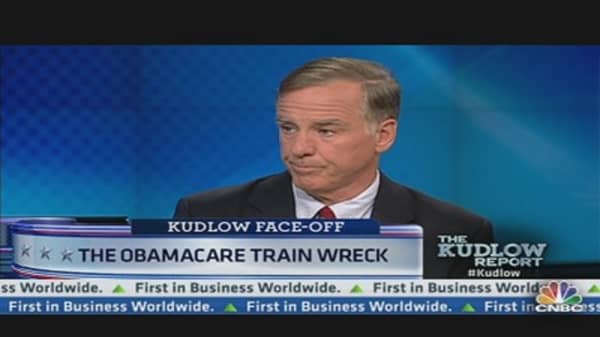What may not happen across the country next year, if Romneycare is any guide, is a dumping of insurance coverage by businesses. Fears circulated that many companies in Massachusetts would stop offering health insurance to workers starting in 2006 because of the costs. The thinking was that firms would rather pay the penalties for not offering insurance than to pay for the insurance itself.
But during the life of Romneycare, and even the year before, the percentage of firms with three or more workers that offer insurance rose from 70 percent to 76 percent, according to the Massachusetts Employer Survey.
It looks like that sentiment could repeat itself nationally. Nearly 70 percent of benefits professionals said in a poll that their companies "definitely will" keep offering coverage to full-time workers next year, according to a recent survey from the International Foundation of Employee Benefit Plans.
(Read more: When It Comes to Health-Care Reform, the IRS Rules)
Another reflection of the future from Romneycare —and not for the best—is what's happening to small businesses.
Health insurance premiums went up by double-digit percentage points for small business policies in the state for four out of the first five years of the reform law, according to the Retailers Association of Massachusetts. Some of that is a result of rising health care costs, but some is also from additional coverage—such as mental health—that businesses must offer under both reform laws.
Adding to the problem for small businesses in Massachusetts was that many did not take part in an insurance exchange set up to help lower costs. The exchange was halted after a year due to a lack of participation.
The Retailers Association of Massachusetts say that costs under Obamacare—which exempts businesses with less than 50 workers from the mandate, while it's 11 in Massachusetts—could rise in the double digits again in the state next year.
State health insurance exchanges set up through Obamacare, which are either run by the states or the federal government starting this October, are supposed to help reduce costs. Analysts aren't so sure.
"I would say that both plans don't really focus enough on reducing health care costs," said Peter Marathas, a health and benefits lawyer in the Boston office of Proskauer.
"Since Romneycare, costs for employers have gone up at least five percentage points over the national average," Marathas said. "There's administrative costs, premium costs, and it all ads up. We really need to focus on that, and these laws don't in my opinion."
Romneycare was expected to prevent businesses, especially smaller ones, from hiring more workers as they attempted to avoid going over the 11-person limit and being penalized if they didn't offer health insurance coverage. Those fears exist with Obamacare as well.
But a study last year by the Urban Institute said that Romneycare did not result in any significant job decreases, and that any job hiring freeze was due more to the troubled economy. Going forward, things might not be so clear cut.
"We have heard reports from across the retail community, including our restaurant members, that the penalty mandates are affecting expansion, franchising and hiring decisions today," said Neil Trautwein, vice president and employee benefits policy counsel of the National Retail Federation, in congressional testimony about Obamacare in 2011. The Congressional Budget Office estimated in 2011 that employers will create 800,000 fewer jobs by 2021 as a result of the law's policies.





